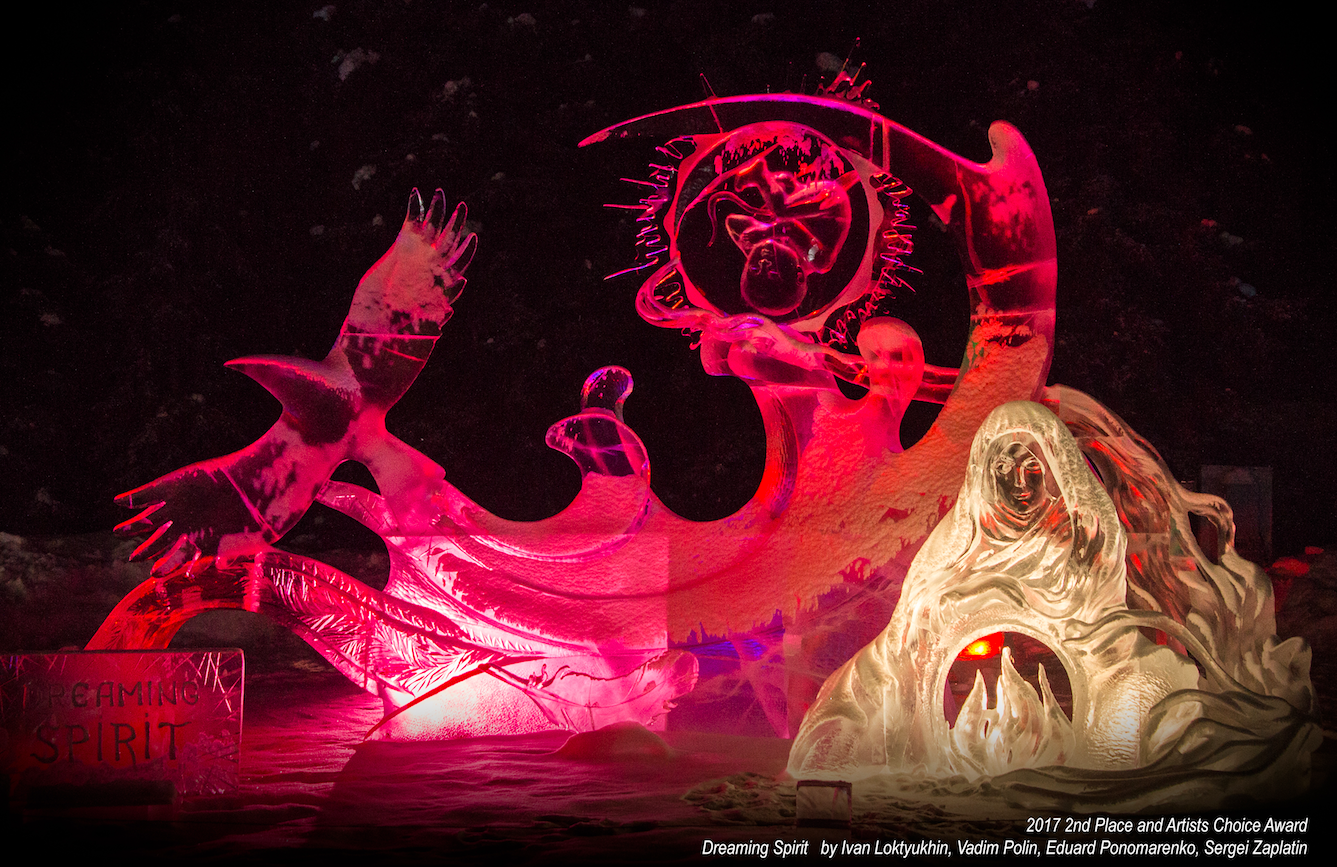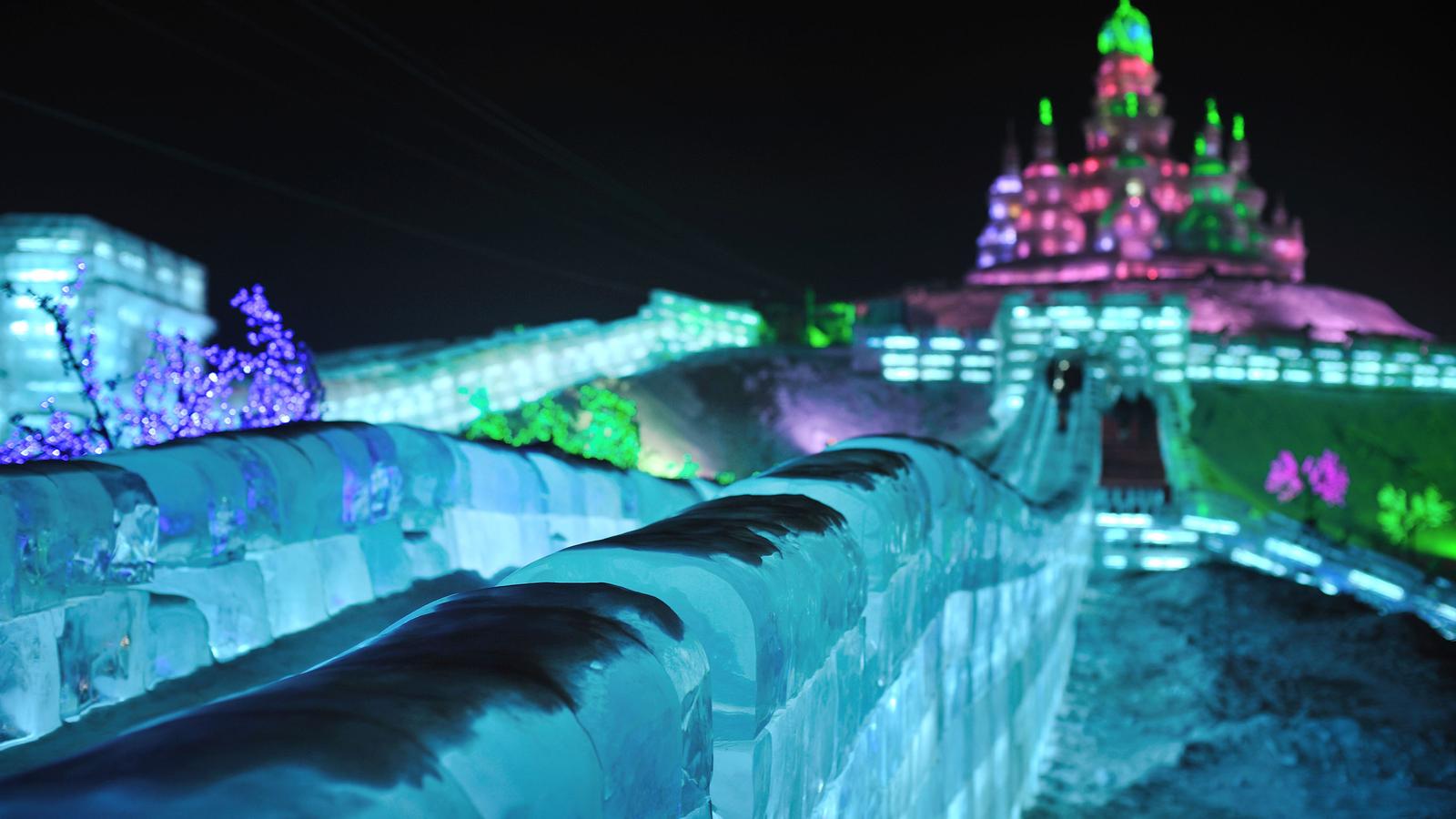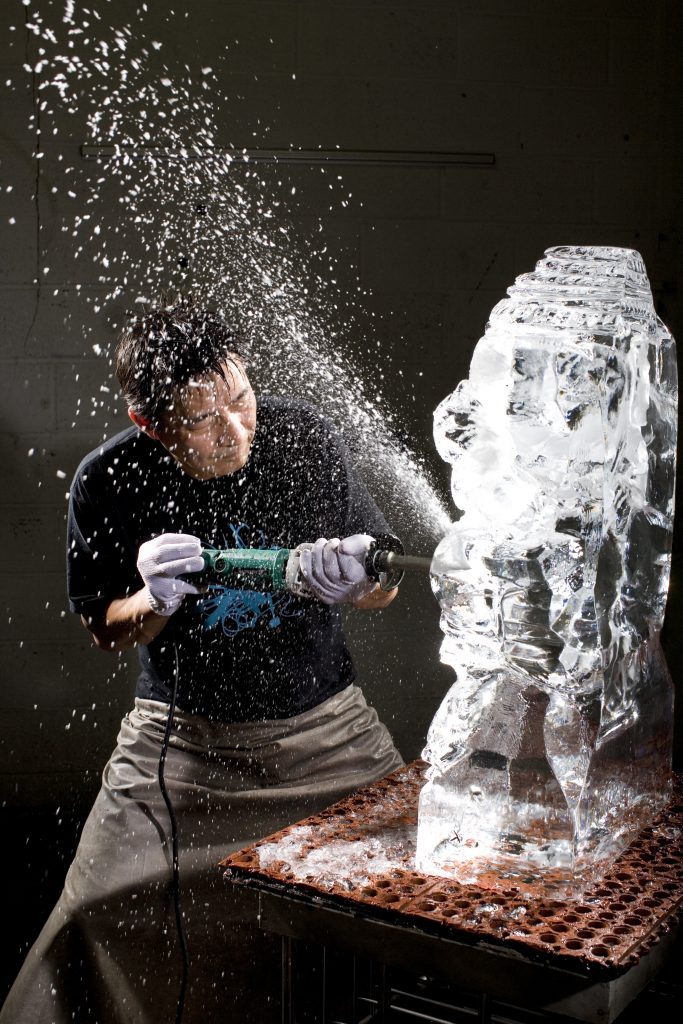By Melissa Sorge
The holiday season glistens, festive with decor and lights–a winter wonderland wrapped in ribbon, drenched in the scent of fir and cloves, and fondly reminiscent of childhood memories and the excitement of feeling utterly alive. It is this time of year when ice sculpture art catches our eye and captures our heart. The distinctive art form, sparkling and effervescent, renders us captive to its beauty and intricacy before it melts, ever so delicately, away. An impermanent yet visceral fine art, ice sculpting is synonymous with the glamour and beauty of the winter holidays.
At festivals, competitions, cultural events, and private functions around the world, ice sculptures bring beauty and character to their surroundings, and the artists who create them do so with unmatched skill and technique. Sculptors start with a creative vision and then utilize technical skills and knowledge to bring their pieces to life. Beginning with a large block of ice, ice sculptors must remove pieces of the ice, little by little, with tools such as chisels, chainsaws, files, and torches to achieve the desired shape. Artists must work quickly, cognizant of environmental conditions, as ice will only retain its shape for a short period of time in warm climates. Finally, when the piece is finished, sculptors are expected to deliver their finished products to their clients or to a show or competition fully intact and unmelted. There is certainly a great amount of skill and precision involved in this craft!
 While ice sculptures may appear the epitome of modern art, they have a long history dating all the way back to 17th century China. Though communities used ice functionally, for creating shelters, 17th century China was home to the first decorative ice creations. In the small fishing village of Harbin, the capital of China’s northernmost province, Heilongjiang, fisherman froze buckets of water, removed the ice, and carved holes in the buckets into which they would place candles. The innovation became a lantern, of sorts, and served as a guide for nighttime fishing excursions.
While ice sculptures may appear the epitome of modern art, they have a long history dating all the way back to 17th century China. Though communities used ice functionally, for creating shelters, 17th century China was home to the first decorative ice creations. In the small fishing village of Harbin, the capital of China’s northernmost province, Heilongjiang, fisherman froze buckets of water, removed the ice, and carved holes in the buckets into which they would place candles. The innovation became a lantern, of sorts, and served as a guide for nighttime fishing excursions.
The technique quickly spread, and before long, townspeople began carving their own lanterns using a variety of techniques and designs, and displaying them decoratively in their homes. Citizens also began bringing their new ice creations to parades and carnivals for public display. Towards the end of the 19th century, when railroads emerged in Harbin, the town began hosting an annual winter ice sculpture festival which remains one of the most prominent ice sculpting festivals in the world to this day.
 At the 2019 Harbin International Ice and Snow Sculpture Festival, the most talented ice sculptors from around the world will gather to showcase their work amid an illuminated city of ice. From Jan. 5, 2019 to Feb. 28, 2019, the town of Harbin will transform into a winter paradise where visitors can view an elaborate ice lantern festival, witness snow and ice sculpture competitions, and stroll through snowy worlds filled with whimsical and inspired ice creations. The festival is sure to awe spectators with life-size renderings of historical landmarks and buildings. Visit at night for a light-filled winter experience. Other noteworthy ice festivals this winter include the Sapporo Snow Festival in Japan, the Ice Sculpture Festival in Bruges, the Moscow Ice Festival, and the World Ice Art Championships right here in the USA.
At the 2019 Harbin International Ice and Snow Sculpture Festival, the most talented ice sculptors from around the world will gather to showcase their work amid an illuminated city of ice. From Jan. 5, 2019 to Feb. 28, 2019, the town of Harbin will transform into a winter paradise where visitors can view an elaborate ice lantern festival, witness snow and ice sculpture competitions, and stroll through snowy worlds filled with whimsical and inspired ice creations. The festival is sure to awe spectators with life-size renderings of historical landmarks and buildings. Visit at night for a light-filled winter experience. Other noteworthy ice festivals this winter include the Sapporo Snow Festival in Japan, the Ice Sculpture Festival in Bruges, the Moscow Ice Festival, and the World Ice Art Championships right here in the USA.
 Although a much younger country than some of the other ice festival hosts, the United States has a rich ice carving history as well. Alaska, the host state for the World Ice Art Championships since 1990, is known for its cold temperatures, thick ice, and innovative ice harvesting techniques. Even thousands of years ago, Inuits passing through present-day Alaska took advantage of the bounty of ice, using it to create temporary shelters. Now, the Championships provide a venue for Alaskan natives and prominent ice sculptors from around the globe to display their ice carving talents. The 2019 World Ice Art Championships will take place in Fairbanks, Alaska, on the fairgrounds of the Tanana Valley Fair Association and will be sponsored by Ice Alaska, an organization committed to preserving the art of ice sculpting through educational programs and community outreach.
Although a much younger country than some of the other ice festival hosts, the United States has a rich ice carving history as well. Alaska, the host state for the World Ice Art Championships since 1990, is known for its cold temperatures, thick ice, and innovative ice harvesting techniques. Even thousands of years ago, Inuits passing through present-day Alaska took advantage of the bounty of ice, using it to create temporary shelters. Now, the Championships provide a venue for Alaskan natives and prominent ice sculptors from around the globe to display their ice carving talents. The 2019 World Ice Art Championships will take place in Fairbanks, Alaska, on the fairgrounds of the Tanana Valley Fair Association and will be sponsored by Ice Alaska, an organization committed to preserving the art of ice sculpting through educational programs and community outreach.
If traveling to Asia, Europe, or even Alaska is not in your near future, you can still appreciate the art of ice sculpting right here in the tri-state area. Our own New York City is home to a world-renowned custom ice studio founded by father-and-son duo Takeo and Shintaro Okamoto. Originating in Japan, the Okamoto family moved to Alaska, where Shintaro followed in his father’s footsteps and fostered his passion for ice carving. When we asked Shintaro why he works with ice as opposed to other mediums to create his art, his response revealed his deep passion for the craft. He asserted: “Ice is no doubt a tricky material—wet, cold, slippery, and heavy. But it is beautiful and humbling, and it is exhilarating to carve just like any other material but so much faster with very sharp tools.” At their creative headquarters in New York City, Takeo, Shintaro, and their team work with both traditional hand-tools as well as innovative technologies to carve unforgettable pieces including sculptures, public installations, brand logos, and party decor.
Okamoto Studios embodies the essence of the fine art of ice sculpting, recognizing that the beauty of the art lies in its impermanence. Shintaro Okamoto believes that, “…sculpted ice physicalizes the present moment, like a performance art or the most precious meal of your life, something ephemeral, precious, to cherish only as memory.” What better way to feel alive, present, and exhilarated than by taking in the beauty of sculpted ice—the art itself is but momentary, but the experience and the memories will last forever.
MORE Lifestyle STORIES
Get an inside vue on the latest in luxury. You heard it here first.



